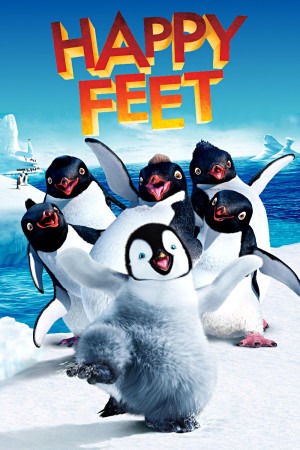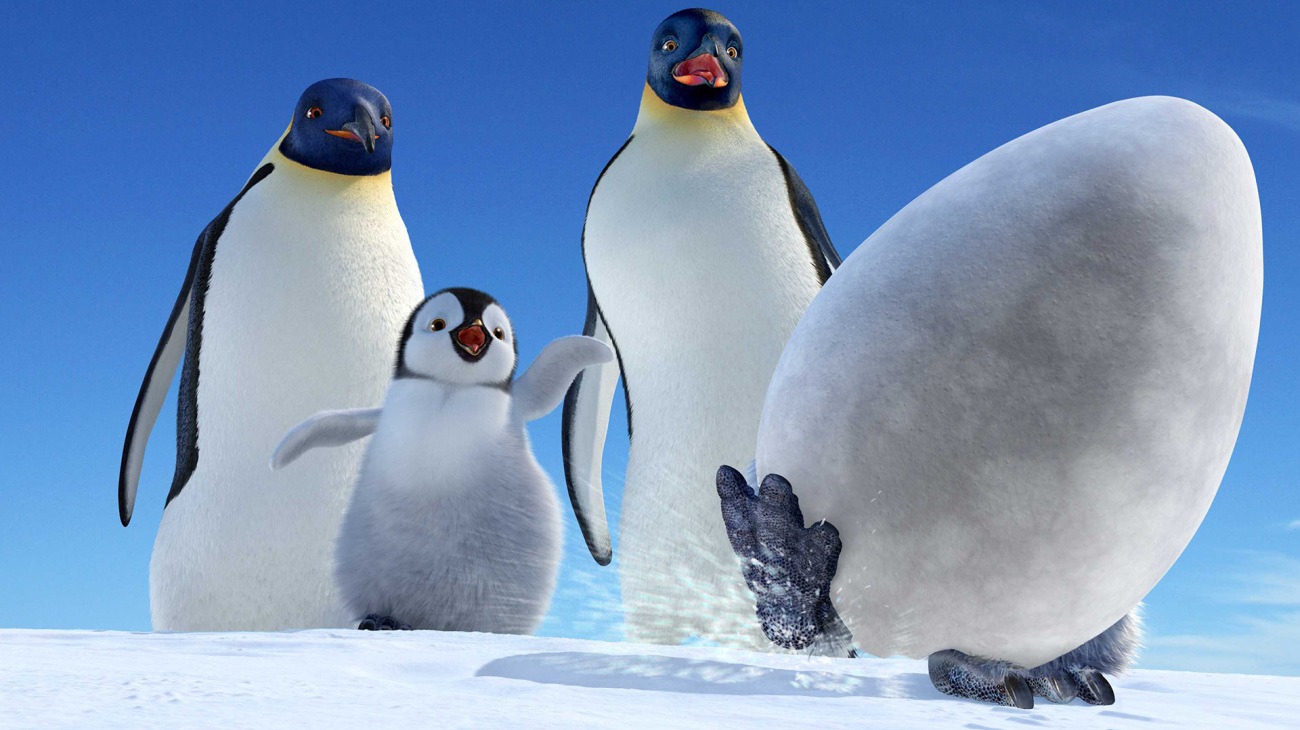
Penguins united against the man
According to the invariably-correct Wikipedia, 2006 has borne witness to the highest number of theatrically released animated features in Hollywood's history, and the great majority of those involved sassy CGI animals behaving like humans in obnoxious and unamusing ways. What a relief - and honestly, a thrill - that the final animated film of the year, which does include sassy CGI animals who do act like humans, is neither obnoxious nor unamusing, but is rather at the very top of the pack as both the best cartoon and the best family film of 2006.
And yet, "family film" is hardly the phrase I want to use to describe Happy Feet, the latest film from George Miller, the director of such rosy family fare as Mad Max and Lorenzo's Oil, or perhaps more to the point, the dystopic and sometimes frightening Babe: Pig in the City. Here is a "family film" dealing with sex, social revolution, fundamentalism and in the discordant third act, overfishing in Antarctica.
I really want to get back to that last point, but in its proper place. Let me start by saying that Happy Feet is the kind of movie that can open with emperor penguins singing pop music to each other, and it can treat this with the deathly solemnity of a religious ritual. Because it is religious, after a fashion: in short order, we learn that this act - the singing of "heartsongs" - is a major component of how the penguin world works, how the society can ensure the constant approval of the Great Guin, who in turn rewards them with bountiful harvests.
Anyway, two penguins fall in love and have an egg. During the long winter (a short sequence that is, surprisingly, the only sign that the filmmakers saw March of the Penguins; that and, y'know, all the penguins) the egg undergoes a mishap and the result is Mumble (voiced as a baby by Elizabeth Daily, as an adolescent by Elijah Wood), a penguin who can't sing but loves to tap dance, in a series of performances motion-captured by Savion Glover. This shakes the penguin community to its core, and Mumble is ostracized, and eventually banished, blamed for causing the recent fish shortage.
Now, when you find yourself with a concept like this, you don't have to commit to it fully. But Miller does. Wisely, I think, for it keeps the film from becoming a Dreamworks-style boondoggle of wisecracks and parody. For all that it contains plenty of real humor (make no mistake, it's a comedy), Happy Feet is perfectly serious about its world. This is a story that takes place in an entirely coherent fantasy universe. When penguins start talking like Latino street toughs, or belt out Queen's "Somebody to Love," we believe it because Miller believes it. This is, by a far margin, the most sincere animated film in ages, and infinitely better for it.
The film is the child of many influences, but I think the most prominent is Moulin Rouge!, and not just because of Nicole Kidman's breathy and mostly ineffective Marilyn Monroe-inflected performance of momma penguin Norma Jean. Like Baz Luhrmann, Miller uses pop music, nearly wall-to-wall, to create a heightened reality. If anything, Happy Feet uses music better than the earlier film, because its reality is already so heightened. Music is used to anchor the audience, to give us a connection to an alien world while simultaneously underlining its alienness. It might be the best-utilised soundrack of the year.
Given this extraordinarily sincere and full world, Miller does the only thing he can do, which is treat it like an epic. Not just in its running time (almost two hours) nor its scope (it begins and ends with shots of the earth spinning in space), but its scale. It is full of wide spaces and huge vistas, never going for the close-up when an aerial shot is available. I have never seen a CGI film with such a sense of grandness, not even in Pixar's more ambitious efforts (Pixar anyways being a studio more at home with the domestic and intimate). Happy Feet is a film David Lean might have directed if he were an animator. And a penguin fancier.
I said it's not much of a family film, and I stand by that, even though it has some of the ingredients. Which is not to say it's forbiddingly adult: Robin Williams is utterly goofy in two roles (fellow Williams-haters: it's far and away his best performance in any medium since Aladdin), there are plenty of playful action sequences, and there's even a fart joke, although thankfully (surprisingly), only one. But, like the Babe films (the first one scripted by Miller), there is a forthright acknowledgement of the darker side of things, even when that goes to grim and scary places. And it takes an adult perspective to grasp all the nuances of the amazingly subtle script, such as (to pluck one example), the way that the film opens with the Beatles' "Golden Slumbers" and closes with "The End," and how this is not a pop-cultury bit of jokery, but a significant element of the story's development.
And then there's the third act, in which George Miller introduces the little ones to the marvels of anti-globalism. Now, I'm as raving a Chomskyite as you'll ever hope to see, but even I can't see the logic of taking a fable about self-identity and adding a great heap of propaganda against the fishing industy. Is overfishing bad? Hell yes! Is overfishing and its place in the global economy a heavy and confusing topic for a kids' movie? Maybe not if the kids are really fucking smart. It's a completely inappropriate insertion, it makes no sense in the context of the film, and it wastes Andrew Lesnie, an overrated but talented cinematographer, on three minutes of footage of live human beings. If it weren't for the way that Miller and his co-writers used this grotesque alien force to create genuinely exciting setpieces, it would threaten to topple the movie entirely. As it is, it just makes for some dumbfounded conversations on the way out of the theater.
And yet, "family film" is hardly the phrase I want to use to describe Happy Feet, the latest film from George Miller, the director of such rosy family fare as Mad Max and Lorenzo's Oil, or perhaps more to the point, the dystopic and sometimes frightening Babe: Pig in the City. Here is a "family film" dealing with sex, social revolution, fundamentalism and in the discordant third act, overfishing in Antarctica.
I really want to get back to that last point, but in its proper place. Let me start by saying that Happy Feet is the kind of movie that can open with emperor penguins singing pop music to each other, and it can treat this with the deathly solemnity of a religious ritual. Because it is religious, after a fashion: in short order, we learn that this act - the singing of "heartsongs" - is a major component of how the penguin world works, how the society can ensure the constant approval of the Great Guin, who in turn rewards them with bountiful harvests.
Anyway, two penguins fall in love and have an egg. During the long winter (a short sequence that is, surprisingly, the only sign that the filmmakers saw March of the Penguins; that and, y'know, all the penguins) the egg undergoes a mishap and the result is Mumble (voiced as a baby by Elizabeth Daily, as an adolescent by Elijah Wood), a penguin who can't sing but loves to tap dance, in a series of performances motion-captured by Savion Glover. This shakes the penguin community to its core, and Mumble is ostracized, and eventually banished, blamed for causing the recent fish shortage.
Now, when you find yourself with a concept like this, you don't have to commit to it fully. But Miller does. Wisely, I think, for it keeps the film from becoming a Dreamworks-style boondoggle of wisecracks and parody. For all that it contains plenty of real humor (make no mistake, it's a comedy), Happy Feet is perfectly serious about its world. This is a story that takes place in an entirely coherent fantasy universe. When penguins start talking like Latino street toughs, or belt out Queen's "Somebody to Love," we believe it because Miller believes it. This is, by a far margin, the most sincere animated film in ages, and infinitely better for it.
The film is the child of many influences, but I think the most prominent is Moulin Rouge!, and not just because of Nicole Kidman's breathy and mostly ineffective Marilyn Monroe-inflected performance of momma penguin Norma Jean. Like Baz Luhrmann, Miller uses pop music, nearly wall-to-wall, to create a heightened reality. If anything, Happy Feet uses music better than the earlier film, because its reality is already so heightened. Music is used to anchor the audience, to give us a connection to an alien world while simultaneously underlining its alienness. It might be the best-utilised soundrack of the year.
Given this extraordinarily sincere and full world, Miller does the only thing he can do, which is treat it like an epic. Not just in its running time (almost two hours) nor its scope (it begins and ends with shots of the earth spinning in space), but its scale. It is full of wide spaces and huge vistas, never going for the close-up when an aerial shot is available. I have never seen a CGI film with such a sense of grandness, not even in Pixar's more ambitious efforts (Pixar anyways being a studio more at home with the domestic and intimate). Happy Feet is a film David Lean might have directed if he were an animator. And a penguin fancier.
I said it's not much of a family film, and I stand by that, even though it has some of the ingredients. Which is not to say it's forbiddingly adult: Robin Williams is utterly goofy in two roles (fellow Williams-haters: it's far and away his best performance in any medium since Aladdin), there are plenty of playful action sequences, and there's even a fart joke, although thankfully (surprisingly), only one. But, like the Babe films (the first one scripted by Miller), there is a forthright acknowledgement of the darker side of things, even when that goes to grim and scary places. And it takes an adult perspective to grasp all the nuances of the amazingly subtle script, such as (to pluck one example), the way that the film opens with the Beatles' "Golden Slumbers" and closes with "The End," and how this is not a pop-cultury bit of jokery, but a significant element of the story's development.
And then there's the third act, in which George Miller introduces the little ones to the marvels of anti-globalism. Now, I'm as raving a Chomskyite as you'll ever hope to see, but even I can't see the logic of taking a fable about self-identity and adding a great heap of propaganda against the fishing industy. Is overfishing bad? Hell yes! Is overfishing and its place in the global economy a heavy and confusing topic for a kids' movie? Maybe not if the kids are really fucking smart. It's a completely inappropriate insertion, it makes no sense in the context of the film, and it wastes Andrew Lesnie, an overrated but talented cinematographer, on three minutes of footage of live human beings. If it weren't for the way that Miller and his co-writers used this grotesque alien force to create genuinely exciting setpieces, it would threaten to topple the movie entirely. As it is, it just makes for some dumbfounded conversations on the way out of the theater.
Categories: adventure, animation, musicals, sassy talking animals






